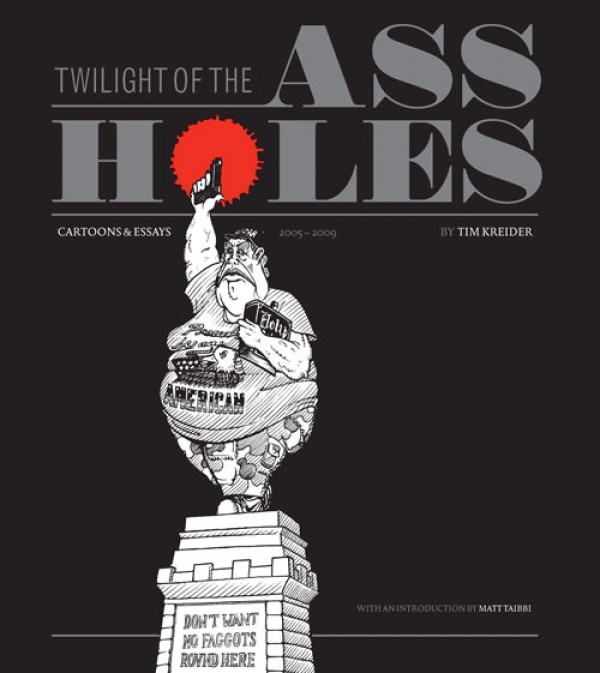 Home > CR Interviews
Home > CR Interviews CR Sunday Interview: Tim Kreider
posted June 6, 2011
CR Sunday Interview: Tim Kreider
posted June 6, 2011


*****

It's my hope that the following interview with
Tim Kreider comes close to replicating the experience of reading the author's new book,
the Fantagraphics-published February offering Twilight Of The Assholes. Both are long, both I hope are funny at times nearly all the way through (the book surely is), and both book and interview prove uncompromising in terms of both self-laceration and repeatedly stabbing the country's excesses, shortcomings and hypocrisies right in the face. I met Tim Kreider at an
SPX several years ago; I don't know of any editorial cartoonist with quite his comfort level in the many overlapping worlds of comics culture -- at least some of them, anyway -- a subject he addresses below with class. Kreider is a fine writer with a book of prose essays on the horizon, maybe as skilled a writer as there is out there also working with cartoons, and luckily
Twilight Of The Assholes includes both the cartoons and mini-essays explaining each one. I find him almost terrifyingly funny, both when I agree with him and when I don't. I enjoyed the heck out of the following exchange. Two notes. First, when Kreider calls my questions dorm-room fodder he's not taking an out-of-nowhere shot at me; I called them that first in our private correspondence in and around the interview. Second, I feel compelled to confess that our private conversations consisted almost solely of detailed discussions of favorite
Star Trek: The Next Generation episodes and characters (Tim, strangely enough, is a
Riker man). I just feel better getting that out there.
If you have ever leaned in the direction of the opinions Tim discusses below, especially in terms of the years covered, 2005-2009, or can at least laugh at same, you want this book. -- Tom Spurgeon
*****
TOM SPURGEON: First of all, I want to ask about the provenance of the material in the book. It's cartoons and scathing, prose commentary, but I can't tell if the commentary was written and/or published at the same time as the cartoons or later on, and I'm not sure where this work was originally published. Can you unpack that as explicitly as possible? I don't mean this as a criticism, I'm just curious.
TIM KREIDER: The cartoons were originally printed in alternative weeklies -- mainly my hometown one, the
Baltimore City Paper, but also, at times, in a few others around the country. I also posted them concurrently on my website,
thepaincomics.com.
Not sure whether this obviates your question, but I think my afterword makes clear that the essays in the book were originally written as what I semi-facetiously called "artist's statements" (after the horseshit that fine artists are often forced to write for galleries to explain their work to the unperceptive but wealthy public) on my website. As I also say in the afterword, I went back and revised them to make them a little more presentable for print publication, which, as a child of the 20th century, I still take way more seriously than Internet posts. But I tried to keep myself from revising all the sloppy spontaneity out of them -- I wanted them to retain some of the you-are-there urgency of dispatches from the cultural front.
Soon after I started including these artist's statements on my website, a friend of mine, who has never hesitated to offer diplomatic constructive criticism, wrote me and begged/commanded me to stop it: "
They are ruining everything!" he said. Whether they Ruin Everything is for readers to decide. I tried to avoid explicating my cartoons in them, as I really do believe that art is best left alone to speak for itself. They're more like tangential rants about political issues that I couldn't adequately address in cartoon form. I studied writing in school, it's what I'd intended to do before I accidentally became a cartoonist instead, so I guess I just couldn't resist using the soapbox of the website to mouth off about whatever was getting under my skin that week. Quite a lot of readers wrote in to tell me they enjoyed the artist's statements at least as much as the cartoons, which I, being a touchy, insecure type, chose to construe as an insult to my art rather than a compliment to my prose.
Gary Groth, who acted as my editor, felt the essays s


